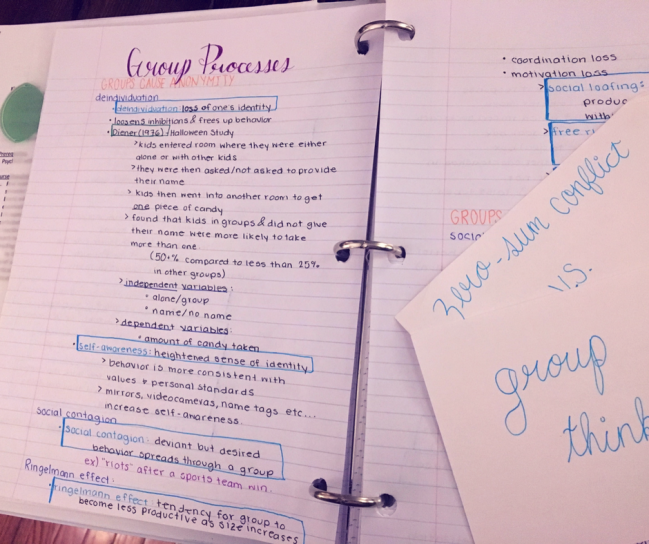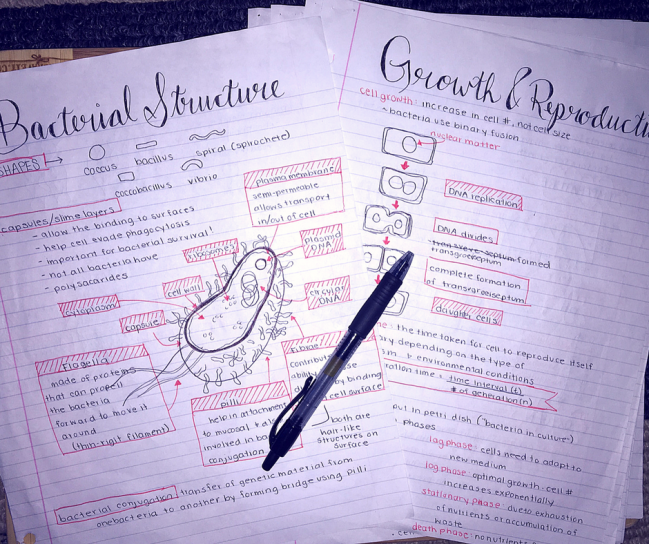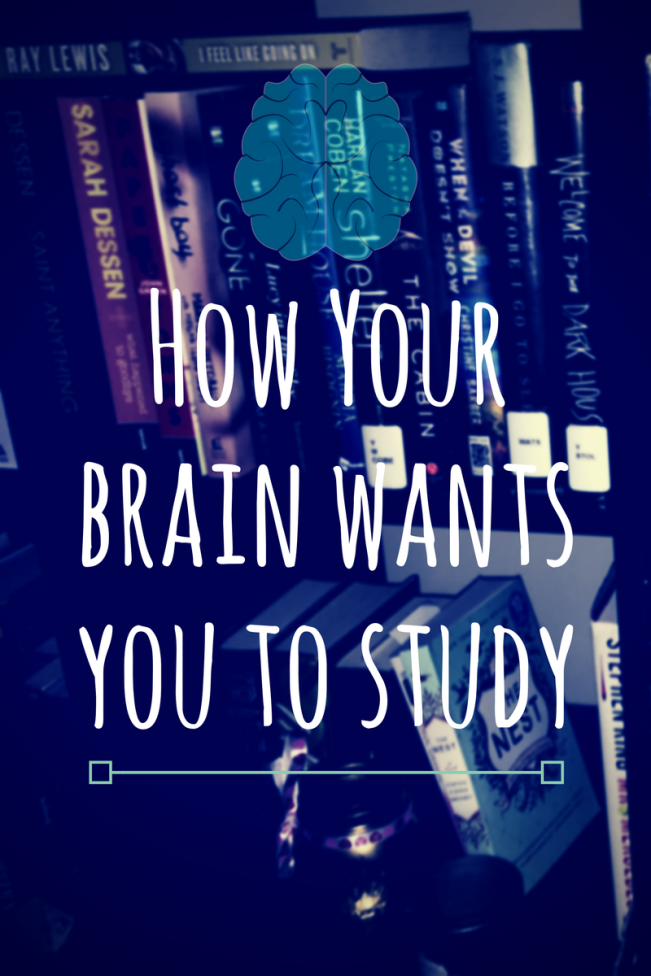Study Tips Using Physiological Psychology
The big question a lot of students have is what is the best way to study? You may have never even been given a straight forward answer. It is true that individuals have different learning types and may have a way to study that works better for them than it does for someone else. But, how does your BRAIN want you to study? Maybe learning a little more about how your brain processes information can help you devise a great study plan that will actually work!
Repetition, repetition, repetition
This may come as no surprise but, repetition is one of the key components in pushing information from short-term memory into long-term memory in order for you to be able to recall it later on. The more times you go over your notes and information, the more likely you are to remember it for your test. Flashcards can be a great way to implement this idea because you are seeing it over and over as your practice your flash card set.
Emotional Context
Most of your life memories that you are able to recall are ones that are emotionally significant to you. This can be positive or negative depending on the memory. You might vividly remember your 4th birthday party because that’s you met your best friend and it was Elmo theme which you were obsessed with at the time so you remeber this as one of the best days EVER! You may also remember the time you almost drowned in a pool because you were trying to impress the cool, big kids and swam into the deep end. The point is, you remember these events because there is a significant and strong emotion behind them.
This may be a hard concept to apply to studying but, maybe by watching a video on the topic made by someone you really enjoy watching or someone who jokes around about the topic that you also enjoy. Sometimes, I find that studying with a friend (even though that might pose a distraction) can help you remember more of the information. As you both talk things over, the conversation might stick in your mind better than just reading over your notes. For example, you might remember something they said about a concept or the fact that they pronounced one of your vocabulary words weird. Whatever it is, you will be able to recall the context of the conversation and therefore your information during the test.

Create A Study Environment
This sort of goes along with the whole concept of emotional memory but, expanding on that, you are more likely to remember something if you are in the same environment that you studied in. Studying in an academic environment, such as your university, might be the best idea. Studying at school also gives you the advantage of having fewer distractions. If you can’t study on campus, for whatever reason, there may be a simple solution! Try create yourself a constant study space in your room where you do all of your studying in preparation for your tests! You don’t even really need to physically create a study space. You can achieve the same goal by simply studying in the same place in your apartment – your desk, the kitchen table, wherever you study the best. This also helps kick your brain into learning mode because you (and your brain) are used to studying in this spot so, when you are in this space, your brain prepares for learning! When you take your test, if you are struggling to remember something that you KNOW you went over you can try visualizing your study space and try to recall the memory of you studying that concept. By using this method, you might have a better chance of actually remembering it.
Smell Your Notes
Okay, I don’t mean to literally smell them..but you’ll understand. Emotion isn’t the only thing that can enhance memory retention, smells can also help as well. You may be thinking to yourself this cannot possibly be true! but, think about this for a minute. Have you ever driven past a coffee shop or smelled someone’s perfume and the smell itself starts bringing back memories. The smell is so familiar to you that you can remember some of the memories surrounding the time when the scent was present.To incorporate this idea into studying, you could diffuse an essential oil of your choice (peppermint and lemon are good for concentration) in your study space or wear a certain perfume when you study AND when you go to take the test. This may not always be the most ideal or practical strategy. Luckily, what I have found also works is chewing mint gum both when studying and when taking tests or eating chocolate. Because the senses of smell and taste are very closely related in terms of how your brain processes their specific sensory information, this can be a good loop-hole for the times when you don’t have a diffuser handy during your test (which is probably quite often).
Don’t Just Read Your Notes
Even though repetition is very important (as we went over previously) you DON’T want to just sit there and read your notes over and over again. Not only is this method super boring, it might not even be the best strategy to help your brain absorb the information. One thing I always recommend for anyone who wants to develop better study habits is to rewrite your notes. Not only does it your notes look nicer and more organized, it also allows you the chance to go through all of the information a second time and even give you an idea of concepts you don’t quite understand/may need more clarification on. Another approach to this is to add images to your notes! Pictures are very easy for your brain to process and recall later on because there are more components for it to latch on to. So, draw out processes and make diagrams! Make your notes as simplistic as possible to give your brain an easier time.
Switch It Up
Expanding a bit on the previous tip of not only reading your notes several times, you should also switch content types in order to look at the information in several different ways. Let me explain. When you read your notes, you’re looking at words, and if you add drawings – images. This is all great stuff for your brain BUT you might need to give your brain more options. You can watch videos about the topic, play games designed for learning the concept (if possible), quiz yourself, make flow charts, etc. – basically do anything and everything you can with the information. This lets you hear, read and visualize the information which is GREAT for recall because it requires the recruitment of many different senses. Ultimately, this means that the same information is being processed several different ways in severeal areas of the brain.

Break Often
I feel like this is another obvious one. You may feel inclined to put off studying until you have no choice but to attempt to cram a month’s worth of information into your poor, over-worked brain in 8 hours. As some of you may already know, this is definitely not the best thing to do. For one, it is extremely stressful which does not help learning. Your brain (and you) do not typically work well under stress. Spreding your studying out a few days will often prove to be very beneficial. You could divide up your notes into a few main sections/topics and go over one of these a day for a few days leading up to your exam. Breaking up the amount of information that you are trying to have your brain process and retain will be much more effective!
You notes are not all you should break up, however. You should also incorporate breaks into your study time about every 90 minutes or so. Taking short breaks – about 5-10 minutes – will help to increase the amount of information being retained by allowing your brain the time to actually process what you just went over. Don’t get too distracted during these breaks because that might lead to major procrastination, which will be no help at all!
Sleep is Key
Last, but CERTAINLY not least – YOU NEED TO SLEEP! As a college student, I know from experience that some days you will realize how much work you’ve been putting off and now – it’s crunch time. You stay up all night in an energy-drink/caffeine enduced panic trying to get as much work done as you can before the sun comes up. I know we have all heard this time after time that sleep is good for you. But guys…this is true! Your brain needs time to rest and replenish it’s energy for the next day. Just think about all the work it has to do every day to keep you alive and learning! Not only is sleep a great habit for healthy living, it also helps with studying! While you sleep your brain is still active, processing information and events from your day. This information includes all the studying you did that day. So, while you sleep your brain essentially “keeps studying” and works on transferring that information into your long-term memory. Pretty neat, right?
I have learned a lot about the processes and functions of the brain over the years, being a Biology/Psychology major. I find it really fascinating to learn how these sort of behind-the-scene processes of the brain work and love to apply this knowledge to help better my own habits and life. I’m happy I have the opportunity to share some of this information with you and I hope that maybe you learned something or at least were entertained!
Leave comments below if you try any of these study tips and how it went! Also, let me know how YOU study? I’d love to hear from you!
Fairwinds!


Really good tips ! 😀 as a former psychology student this reminded me of my time in college ! I remember once trying to read my notes chewing a strawberry gum so that, during the exam I would have remembered everything if I chewed the same gum hahaha ! It might work but if you try this the day before your exam it doesn’t !
LikeLike
I am studying psychology currently and one of my favorite classes was Physiological Psychology! haha I have tried using gum as well and it didn’t work too well, you need to do it a lot to really establish the association i guess! haha
LikeLiked by 1 person
Yes I think it takes time !! 🙂
LikeLike